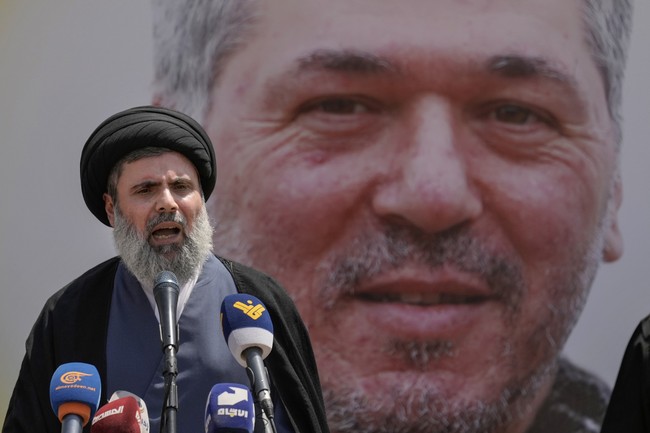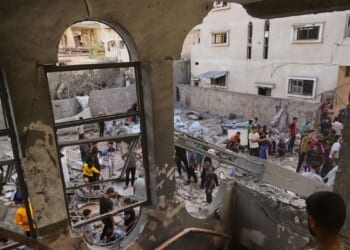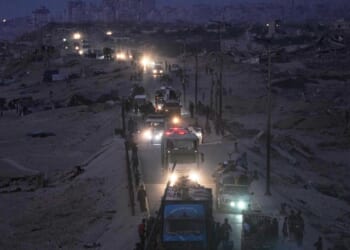
Almost exactly a year ago, Israel signed a 60-day ceasefire with Lebanon that paused – not ended – the October 7 war with Hezbollah. The agreement required Lebanon to disarm Hezbollah and for both to abide by UN Security Council 1701, which decades earlier had ordered Hezbollah to evacuate the sub-Litani and Bekaa Valley areas of the country. The government in Beirut has since ordered Hezbollah to disarm but has taken no steps to force the issue, and Hezbollah continues to operate in both prohibited areas of Lebanon.
In recent weeks, Israel has increased military strikes on Hezbollah positions and personnel. Yesterday, however, the IDF took aim at Hezbollah’s top leadership and killed the man most responsible for their recent attempts to reconstitute their position in southern Lebanon:
Israeli forces killed Hezbollah’s military chief of staff on Sunday with an airstrike on Beirut, the first attack on the Lebanese capital in more than five months.
The attack, which hit a residential building in the densely packed neighborhood of Haret Hreik in southern Beirut, targeted Haytham Ali Tabatabai, a Hezbollah veteran considered one of its highest remaining military officials. Israeli and Hezbollah officials confirmed Tabatabai’s death. …
“We will not allow Hezbollah, the terror organization, to recover and rebuild its strength and threaten Israel from anywhere inside of Lebanon,” said Shosh Bedrosian, a spokesperson for Israeli Prime Minister Benjamin Netanyahu’s office. Hezbollah’s “activities continue to constitute a violation of the understandings between Israel and Lebanon,” she added, without providing details about how the group has been trying to rebuild its capabilities.
The fact that Hezbollah still operates in the southern parts of Lebanon is evidence enough of their desire to rebuild. Both the ceasefire and UNSC Resolution 1701 prohibit their presence in those areas. The UN’s peacekeeping force is supposed to enforce the latter, but instead has become a co-conspirator to their continued grip on the region, acting as human shields against IDF actions to force compliance.
The Washington Post notes that the Israelis have run out of patience after a year of non-compliance with the ceasefire:
The attack adds to a growing unease in Lebanon that Israel may renew a broader offensive against Hezbollah. The Israeli military has carried out near-daily strikes in Lebanon since a U.S.-brokered truce last November ended a two-month war, which devastated parts of the country and eviscerated much of Hezbollah’s military prowess.
But the strikes have intensified in recent weeks and their scope has expanded, with Israel increasingly accusing Hezbollah of trying to rebuild its strength and the Lebanese government of being too slow to disarm the group.
After a year? Yes, that’s just a wee bit tardy, one might conclude.
As is customary in Muslim society, Hezbollah held the funeral for Tabatanai today. Turnout was strong on the ground, and in the air:
The funeral of Hezbollah’s Chief of Staff, Tabatabaei, in the Dahieh area of Beirut. pic.twitter.com/AHaDkz71we
— Open Source Intel (@Osint613) November 24, 2025
Israeli drones reportedly patrol southern Beirut as Hezbollah military chief Haytham Ali Tabatabai’s funeral takes place, according to Lebanese media. pic.twitter.com/MYn4sGiA2c
— Open Source Intel (@Osint613) November 24, 2025
That’s not the only warning that Israel is sending today. The Times of Israel reports that the Israeli government believes it can set Hezbollah back years with just a few days of open military operations:
Israel has been escalating its strikes on Hezbollah in recent weeks, accusing the terror group of violating the year-old ceasefire and increasingly attempting to rebuild its capabilities, and expressing frustration at lagging Lebanese efforts to disarm the group.
An unnamed Israeli security source told the Saudi-based Al-Hadath outlet that with just a few days of warfare, Hezbollah could be significantly weakened for many years. The source said that the Lebanese government is not going to deal with disarming Hezbollah, as it has committed to do, and that Israel will not sit back and wait. The source stressed that if Israel does not act against Hezbollah by the end of the year, the terror group could launch a surprise attack on the country.
Israel says that under the terms of the ceasefire, it has the right to strike at Hezbollah threats.
That is certainly true, but there’s even more to this new strike. Until October 7, Israel had felt compelled to ignore defiance and violations of previous ceasefire agreements with both Hamas and Hezbollah to avoid embarrassing their Western partners. After October 7, Israel has made clear that those days are over. They gave Lebanon a year to make good on its commitments to disarm and remove Hezbollah, and the Beirut government has done nothing to meet its obligations. That leaves Israel with all options open to them, and they are clearly prepared for all possibilities. It didn’t take them long to find and take out Hezbollah’s top military commander, and their intelligence will likely lead them to more key targets in the days ahead.
The lesson: Israel is in the FO business for those who FA. And that message is not just intended for Beirut, but also for Gaza City and Tehran.
Editor’s Note: Thanks to President Trump and his administration’s bold leadership, we are respected on the world stage, and our enemies are being put on notice.
Help us continue to report on the administration’s peace through strength foreign policy and its successes. Join Hot Air VIP and use promo code FIGHT to get 60% off your membership.










